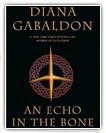Outlander aka Cross Stitch - Gabaldon Diana (библиотека электронных книг txt) 📗
“No, thank you. I think… I think perhaps I will sleep a bit more, after all.” I no longer felt weighed down by guilt and depression, but a drowsy, contented heaviness was spreading through my limbs. Whether it was due to the effects of confession or of wine, I found to my surprise that I was looking forward to bed and to oblivion.
I leaned forward to touch Jamie. He was warm, but with no trace of fever. I gently stroked his head, smoothing the tumbled red hair. The corner of his mouth stirred briefly and fell back into place. But it had turned up. I was sure of it.
The sky was cold and damp, filling the horizon with a grey blankness that blended into the grey mist of the hills and the grimy cover of last week’s snow, so that the abbey seemed wrapped inside a ball of dirty cotton. Even inside the cloister, the winter’s silence weighed on the inhabitants. The chanting from the Hours of Praise in the chapel was muted, and the thick stone walls seemed to absorb all sound, swaddling the bustle of daily activity.
Jamie slept for nearly two days, waking only to take a little broth or wine. Once awake, he began to heal in the usual fashion of a normally healthy young man, suddenly deprived of the strength and independence usually taken for granted. In other words, he enjoyed the cosseting for approximately twenty-four hours and then became in turn restive, restless, testy, irritable, cranky, fractious, and extremely bad tempered.
The cuts on his shoulders ached. The scars on his legs itched. He was sick of lying on his belly. The room was too hot. His hand hurt. The smoke from the brazier made his eyes burn so that he could not read. He was sick of broth, posset, and milk. He wanted meat.
I recognized the symptoms of returning health, and was glad of them, but was prepared to put up with only so much of this. I opened the window, changed his sheets, applied marigold salve to his back and rubbed his legs with aloe juice. Then I summoned a serving brother and ordered more broth.
“I don’t want any more of this slop! I need food!” He pushed the tray irritably away, making the broth splash onto the napkin cradling the bowl.
I folded my arms and stared down at him. Imperious blue eyes stared right back. He was thin as a rail, the lines of jaw and cheekbone bold against the skin. Though he was mending well, the raw nerves of his stomach would take a little longer to heal. He still could not always keep down the broth and milk.
“You’ll get food when I say you can have it,” I informed him, “and not before.”
“I’ll have it now! D’ye think you can tell me what I’m to eat?”
“Yes, I bloody well do! I’m the doctor here, if you’ve forgotten.”
He swung his feet over the edge of the bed, clearly intending to take steps. I put a hand on his chest and shoved him back.
“Your job is to stay in that bed and do as you’re told, for once in your life,” I snapped. “You’re not fit to be up, and you’re not fit for solid foot yet. Brother Roger said you vomited again this morning.”
“Brother Roger can mind his own business, and so can you,” he said through his teeth, struggling back up. He reached out and got a hold on the table edge. With considerable effort, he made it to his feet, and stood there, swaying.
“Get back in bed! You’re going to fall down!” He was alarmingly pale, and even the small effort of standing had made him break out in a cold sweat.
“I’ll not,” he said. “And if I do, it’s my own concern.”
I was really angry by this time.
“Oh, is it! And who do you think saved your miserable life for you, anyway? Did it all by yourself, did you?” I grabbed his arm to steer him back to bed, but he jerked it away.
“I didna ask ye to, did I? I told ye to leave me, no? And I canna see why ye bothered to save my life, anyway, if it’s only to starve me to death – unless ye enjoy watching it!”
This was altogether too much.
“Bloody ingrate!”
“Shrew!”
I drew myself to my full height, and pointed menacingly at the cot. With all the authority learned in years of nursing, I said, “Get back in that bed this instant, you stubborn, mulish, idiotic-”
“Scot,” he finished for me, succinctly. He took a step toward the door, and would have fallen, had he not caught hold of a stool. He plumped heavily down on it and sat swaying, his eyes a little unfocused with dizziness. I clenched my fists and glared at him.
“Fine,” I said. “Bloody fine! I’ll order bread and meat for you, and after you vomit on the floor, you can just get down on your hands and knees and clean it up yourself! I won’t do it, and if Brother Roger does, I’ll skin him alive!”
I stormed into the hall and slammed the door behind me, just before the porcelain washbasin crashed into it from the other side. I turned to find an interested audience, no doubt attracted by the racket, standing in the hall. Brother Roger and Murtagh stood side by side, staring at my flushed face and heaving bosom. Roger looked disconcerted, but a slow smile spread over Murtagh’s craggy countenance as he listened to the string of Gaelic obscenities going on behind the door.
“He’s feeling better, then,” he said contentedly. I leaned against the corridor wall, and felt an answering smile spread slowly across my own face.
“Well, yes,” I said, “he is.”
On my way back to the main building from a morning spent in the herbary, I met Anselm coming from the cloister near the library. His face lighted when he saw me, and he hurried to join me in the courtyard. We walked together through the abbey grounds, talking.
“Yours is an interesting problem, to be sure,” he said, breaking a stick from a bush near the wall. He examined the winter-tight buds critically, then tossed it aside, and glanced up at the sky, where a feeble sun poked its way through the light cloud layer.
“Warmer, but a good way to go until the spring,” he observed. “Still, the carp should be lively today – let us go down to the fish pools.”
Far from being the delicate ornamental structures I had imagined them to be, the fish pools were little more than utilitarian rock-lined troughs, placed conveniently near to the kitchens. Stocked with carp, they provided the necessary food for Fridays and fast days, when the weather was too rough to permit ocean fishing for the more customary haddock, herring, and flounder.
True to Anselm’s word, the fish were lively, the fat fusiform bodies gliding past each other, white scales reflecting the clouds overhead, the vigor of their movements occasionally stirring up small waves that sloshed against the sides of their rocky prison. As our shadows fell on the water, the carp turned toward us like compass needles surging toward the north.
“They expect to be fed, when they see people,” Anselm explained. “It would be a shame to disappoint them. One moment, chere madame.”
He darted into the kitchens, returning shortly with two loaves of stale bread. We stood on the lip of the pool, tearing crumbs from the loaves and tossing them to the endlessly hungry mouths below.
“You know, there are two aspects to this curious situation of yours,” Anselm said, absorbed in tearing bread. He glanced aside at me, a sudden smile lighting his face. He shook his head in wonderment. “I can scarcely believe it still, you know. Such a marvel! Truly, God has been good, to show me such things.”
“Well, that’s nice,” I said, a bit dryly, “I don’t know whether He’s been quite so obliging to me.”
“Really? I think so.” Anselm sank down on his haunches, crumbling bread between his fingers. “True,” he said, “the situation has caused you no little personal inconvenience-”
“That’s one way of putting it,” I muttered.
“But it may also be regarded as a signal mark of God’s favor,” he went on, disregarding my interruption. The bright brown eyes regarded me speculatively.



